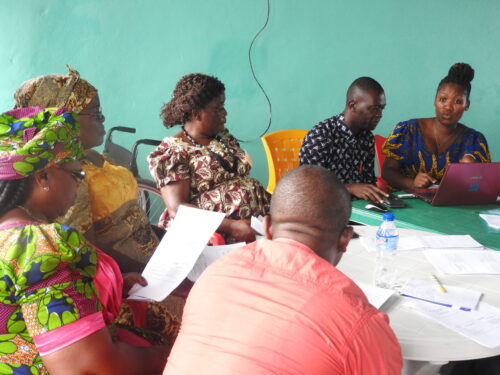Paving the Way for Efficient Service Delivery

USAID | Liberia
Success Story: Paving the Way for Efficient Service Delivery
County Service Charters bring relief to Citizens
“The good thing about this county service charter document is that is gives citizens the chance to hold us…[the government] accountable for the delivery of…services that will benefit their lives.”
Hon. Anthony B. Sheriff | Superintendent, Bong County
Imagine you are a taxi driver, making $70 a month, and your driver’s license expires. To renew it, you have to travel 121 miles from your hometown of Gbarnga to the capital in Monrovia. When you arrive, you wait hours at the Ministry of Transport, only to be told to come back in three days for your license. Tally the days and hours together – on top of the fee for your license and the travel costs, you have lost 23% of your monthly income, all to renew a license.
Liberians have grown accustomed to jumping through such hoops to access basic services. The government has long operated a centralized system of governance where service provision and decision making are concentrated at the national level. In practice, when seeking to access public records or documents such as birth certificates or driver’s licenses, citizens must often navigate the maze of national level agencies far from their own communities.
This has made it difficult for citizens and their local representatives to be heard when it comes to decisions about key public services. Translating their desire into action at the local level has also proven challenging.
This legacy of centralized governance means that, as Liberia continues to progress in decentralizing local decision-making from the national to the local level, counties and citizens alike face a steep learning curve. This is where the USAID Local Empowerment for Government Inclusion and Transparency (LEGIT) project has stepped in. The project decided to build on the Government of Liberia’s progress in establishing County Service Centers that have recently begun to offer basic services in all fifteen counties across the country.
In September 2017, the project led series of workshops on County Service Charters for government officials in Bong, Nimba, and Grand Gedeh counties; and a diverse group of civil society and community-based organizations.
County Service Charters are a tool citizens and government can use to define expectations about public services. They allow citizens to contribute to decisions such as service center operating hours; the amount of time that a county must address a citizen’s request; and the local language in which business will be conducted. When a county signs a service charter, they’ve made a commitment to their citizens that ensure accountability between the government, and those they serve.
LEGIT’s September trainings brought together local representatives and groups that advocate for the needs of women, youth, disabled persons, and other county residents. This emphasis on diverse groups of citizens helped LEGIT ensure that the charters took into account the voices and needs of all citizens – even working with the language they speak and understand.
Seemingly trivial, the language spoken at a service center can impact who has access to community services. People with limited formal schooling, for example, may have difficulty registering their business if they don’t have the option of completing paperwork in their local dialect. With these charters, citizens are now able to point to a commitment, collaboratively made, and hold their representatives accountable to these agreed-upon commitments.
“These charters helped the counties understand not just what services citizens expect of them, but how they should be offered” explained Mr. Mohammed Kromah, Bong County Service Center Coordinator.
Alieu Conneh, a taxi driver living in Gbarnga expressed his gratitude for the county service charter activity. “For the first time, the government is really trying to help us now. Before, we used to spend days in Monrovia for common thing[s] like driver’s license[s].”
Since participating in the activities, the administrations and citizens of Bong, Nimba and Grand Gedeh have signed the charters developed during their workshops. Formalizing these charters means that citizens like Mr. Conneh are now empowered to hold government accountable for effectively delivering services.
To receive updates on the latest content from UrbanLinks, be sure to sign up for our newsletter!

